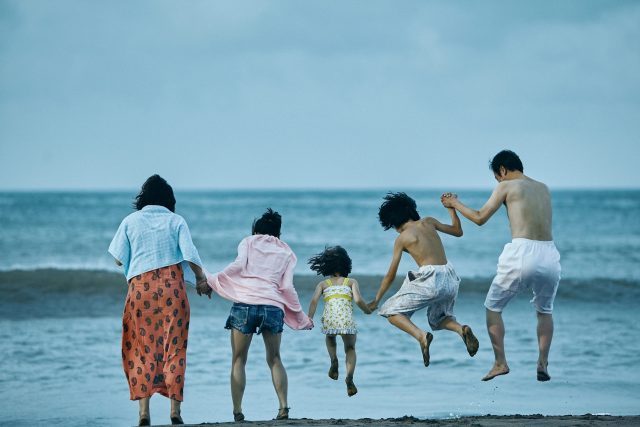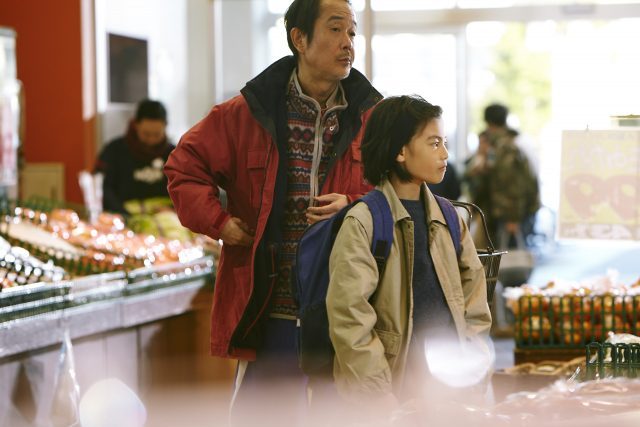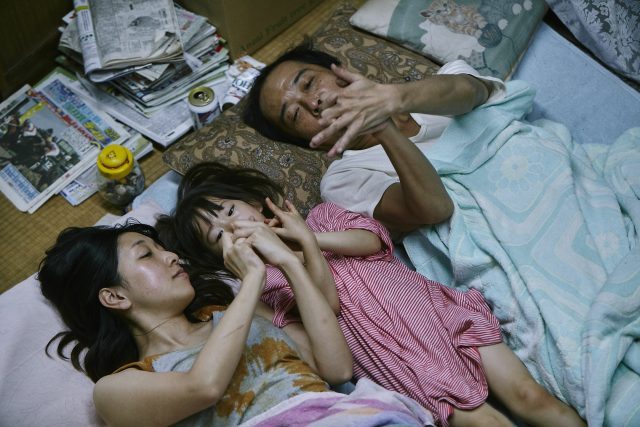
A unique family plays at the beach in Hirokazu Kore-eda’s Shoplifters
SHOPLIFTERS (Hirokazu Kore-eda, 2018)
Film Society of Lincoln Center, Walter Reade Theater, Francesca Beale Theater
144/165 West 65th St. between Eighth Ave. & Broadway
IFC Center
323 Sixth Ave. at West Third St.
Opens Friday, November 23
www.shopliftersfilm.com
 For more than twenty years, Japanese auteur Hirokazu Kore-eda has been making marvelous, honest films about unique family situations; his latest, Shoplifters, winner of the Palme d’Or at Cannes, is yet another masterpiece in a sparkling career. In 1994’s Maborosi, a husband and father unexpectedly commits suicide. In 2004’s Nobody Knows,a twelve-year-old boy must take care of his three half-siblings when his mother disappears for long stretches of time. In 2008’s Still Walking, a family comes together once a year to honor the tragic death of an eldest son. In 2011’s I Wish, real-life brothers play fictional brothers separated when their parents divorce. And in 2013’s Like Father, Like Son, two families are affected when a hospital reports that their babies were accidentally switched at birth six years before. In Shoplifters, Kore-eda again explores the concept of family and what it means. Shibata Osamu (Lily Franky) and Nobuyo (Ando Sakura) run a household that includes aging Grandmother Hatsue (Kiko Kirin), oldest girl Aki (Matsuoka Mayu), and young boy Shota (Jyo Kairi).
For more than twenty years, Japanese auteur Hirokazu Kore-eda has been making marvelous, honest films about unique family situations; his latest, Shoplifters, winner of the Palme d’Or at Cannes, is yet another masterpiece in a sparkling career. In 1994’s Maborosi, a husband and father unexpectedly commits suicide. In 2004’s Nobody Knows,a twelve-year-old boy must take care of his three half-siblings when his mother disappears for long stretches of time. In 2008’s Still Walking, a family comes together once a year to honor the tragic death of an eldest son. In 2011’s I Wish, real-life brothers play fictional brothers separated when their parents divorce. And in 2013’s Like Father, Like Son, two families are affected when a hospital reports that their babies were accidentally switched at birth six years before. In Shoplifters, Kore-eda again explores the concept of family and what it means. Shibata Osamu (Lily Franky) and Nobuyo (Ando Sakura) run a household that includes aging Grandmother Hatsue (Kiko Kirin), oldest girl Aki (Matsuoka Mayu), and young boy Shota (Jyo Kairi).

Shibata Osamu (Lily Franky) teaches Shibata Shota (Jyo Kairi) how to steal in Palme d’Or winner Shoplifters
Hatsue gets a sweetheart rental deal on her small house, her landlord unaware of her extended family living in cramped quarters. To get food and supplies, part-time day worker Osamu and Shota shoplift in tandem, Aki toils in a sex shop, and Nobuyo steals from her laundry job. One night Osamu and Shota see a four-year-old girl, Juri (Sasaki Miyu), alone and hungry and decide to bring her home and feed her. When Osamu and Nobuyo later try to return the quiet little girl, Juri’s parents are fighting so viciously that Osamu and Nobuyo opt to keep her a little longer, a time that stretches out as they rename her and shower her with love and affection. “Sometimes, it’s better to choose your own family,” Nobuyo says to Hatsue, who replies, “If only not to have expectations.” But ultimately, the house of cards the Shibata clan has built comes tumbling down in heart-wrenching ways.

Shibata Nobuyo (Ando Sakura) and Shibata Osamu (Lily Franky) take in young Hojo Juri (Sasaki Miyu) in Shoplifters
Kore-eda started out as a documentarian, and he brings that realistic aesthetic to his fiction films, including Shoplifters, which he wrote, directed, and edited. It moves along at a slow, touching pace as life goes on for the well-drawn, complex characters. Like most families, they just want to be happy, even if that involves taking serious risks. Cinematographer Ryuto Kondo uses close-ups and creative shots in claustrophobic spaces (the wonderful production design is by Keiko Mitsumatsu, while the sweet, jazzy score is by Haruomi Hosono) to emphasize the tenderness of the family, which reaches a new level when they take the kids to the beach for the first time, a kind of calm before the storm. There is also a gorgeous shot of family members seen from above, gathering on their narrow porch to see fireworks, lined up on an angled strip of light amid the darkness. Shoplifting can be a hard crime to watch in films that are not celebrations of the con, as in The Grifters, for example, or even Paper Moon. It’s natural though uncomfortable to root for the stealers, especially when it’s an adult and a young boy just trying to put food on the table; you don’t want the children to get caught even as you are angry at the man or woman for involving kids. And in this case the “shoplifting” includes abducting a young girl, even if it might be the best thing for everyone. Kore-eda takes a gentle, authentic approach to the subject, lovingly depicting a close-knit family doing what it can to survive, living by its wits, knowing that it can all fall apart at any moment. Japan’s official Oscar submission for Best Foreign Language Film, Shoplifters is another subtle gem from one of the world’s premier filmmakers.